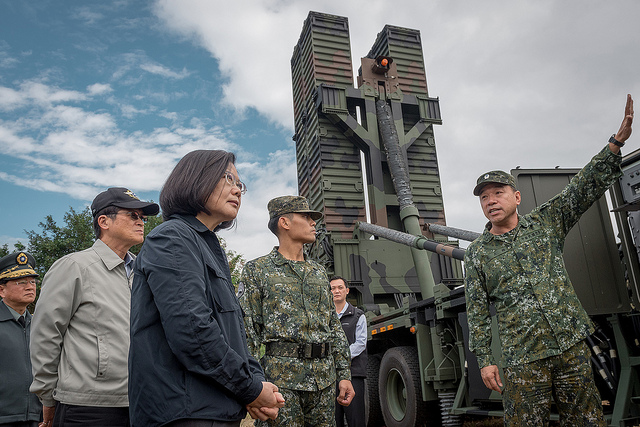
The unfolding geopolitical contest between China and the United States has been described by many as a new cold war. If it ever becomes a hot one, the flashpoint could be Taiwan, owing in large part to Chinese policy towards the island.
China’s government suspended diplomatic contact with Taiwan in June 2016 because the pro-independence Democratic Progressive Party (DPP), which had just returned to power, refused to recognise the so-called 1992 Consensus, the political basis for the One China principle. Since the 2016 victory, however, Taiwanese President Tsai Ing-wen has pursued a moderate policy, disappointing hardline DPP supporters.
That is not good enough for China, which has continued to tighten the screws on Taiwan. For example, it
persuaded five other countries to follow it in severing diplomatic ties, reducing the number of countries that maintain formal relations with the island to just 17. China has also taken steps to stifle tourism from the mainland: whereas
nearly 4.2 million mainland-Chinese tourists visited Taiwan in 2015, when the pro-Beijing Kuomintang government was in power, the total fell to just
2.73 million in 2017.
Taiwan’s government has not blinked. But, last November, the DPP did suffer devastating losses in local elections, largely because of anaemic economic growth—an outcome that drove the politically weakened Tsai to resign as party leader.
For China, this seemed like the ideal moment to turn up the heat. So, on 2 January, Chinese President Xi Jinping delivered a
major speech on Taiwan, in which he made it clear that China remains determined to seek reunification.
Xi dismissed the argument that China’s autocratic political system is fundamentally incompatible with Taiwan’s boisterous democracy, insisting that the ‘one country, two systems’ formula, first applied to Hong Kong when it reverted from British to Chinese rule in 1997, would be sufficient to protect Taiwan’s interests and autonomy. The formula is, however, now unravelling in Hong Kong, where freedoms have been eroding during Xi’s tenure.
Nor did Xi indicate that he would offer concessions to entice Taiwan back to the negotiating table. On the contrary, despite declaring that ‘Chinese will not fight Chinese’, he refused to renounce the use of force to prevent Taiwan from seeking formal independence. China must, in his words, ‘reserve the option to take any necessary measure’, though he claims that the threat is aimed at ‘external forces and at an extremely small number of “Taiwan independence” separatists’.
Again, Taiwan’s government was unfazed. Tsai responded with a defiant
speech of her own, in which she flatly rejected both the One China principle and the ‘one country, two systems’ formula, and called for the international community to support Taiwan’s de facto independence.
Although Xi’s tough stance towards Taiwan may end up reinvigorating flagging support for Tsai and the DPP, there is no reason to think that he will abandon it anytime soon. But nor is there reason to think that China’s policy will stop backfiring. While inflicting economic pain and diplomatic humiliation on Taiwan may produce some short-term psychological satisfaction for China, the island will adjust over time and Chinese actions will yield decreasing returns.
For example, after China cut the number of mainland visitors, Taiwan turned its attention to attracting tourists from other countries. Despite the decline in visitors from the mainland,
11 million tourists—a new record—visited the island in 2018. To reduce its economic dependence on the mainland, Taiwan has also been aggressively diversifying its overseas markets.
And although China’s economy is far larger, Taiwan has some important sources of leverage. For example, restricting its electronics industry—which forms a vital link between China and global information-technology supply chains—from doing business with the mainland would significantly accelerate the exodus of export-oriented manufacturers from China spurred by rising US import tariffs.
Perhaps the most dangerous consequence of China’s Taiwan policy is that it raises further tensions with the United States. As the ultimate protector of Taiwan’s de facto independence, the US has already taken steps to convey the message that it will not just sit by and watch China bully the island into submission. Last February, the US Congress unanimously passed the Taiwan Travel Act, which will allow senior American officials to visit Taiwan and vice versa. Though the measure is largely symbolic, it has infuriated China, because it amounts to official recognition of the Taiwan government.
Furthermore, in September, the US recalled its ambassadors to the Dominican Republic, El Salvador and Panama in protest over these countries’ decisions to sever diplomatic ties with Taiwan. And proposals to strengthen US–Taiwan defence cooperation, including through the sale of more advanced weapons, are under discussion.
So far, China has responded to such challenges to its One China policy by ratcheting up the pressure on Taiwan—sustaining a highly dangerous dynamic at a time when US–China relations are already fraught. Unless China’s leaders break the cycle, an escalating battle of wills with the US could erupt into direct conflict.
 Print This Post
Print This Post